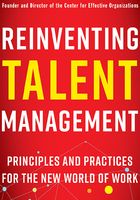
TALENT MANAGEMENT SHOULD BE EVIDENCE BASED
Given the importance of talent management practices and systems in organizations today and their greater importance tomorrow, they need to be based on evidence, not just common sense and experience. This is true in the case of decisions about how individual talent should be treated when it comes to hiring, pay increases, work assignments, and promotions. It is also true with respect to which talent programs, policies, and practices are put in place in an organization. Given the increasing importance of effective talent behavior in organizations, it is time to move beyond the practice of relying on what “seems right” and what “makes sense” with respect to talent management. Decisions need to be made based on research evidence and data.
There is an enormous amount of existing research that establishes what makes for effective talent management. It ranges from research on the effectiveness of secrecy with respect to pay, to how to select and develop highly talented individuals. Unfortunately, too often this evidence is not taken into account when decisions are made in organizations. Managers and executives assume that common sense and experience are their best guides when they are making hiring and other talent management decisions. All too often they are wrong. For example, based on their interviews of job candidates, many managers are confident that they can pick the best candidate. But research shows that hiring decisions based on unstructured interviews simply do not predict performance.
There is no magic way to create more evidence-based talent management, but it is possible for organizations to move in that direction. One approach is to do research. Today many organizations have a great amount of internal data on performance and behavior as well as significant data analysis capability. It is thus possible for them to validate their selection activities and other talent management decisions. Similarly, in many situations it is possible to measure performance to determine which talent, and which talent management practices, are best. In addition, it is possible to gather data about the attitudes and behaviors that predict turnover, absenteeism, and other critical aspects of the workplace. Finally, it is also easier to calculate the cost of turnover and other talent management outcomes that need to be taken into account when decisions are made about talent management.
There is one additional factor that comes into play when organizations gather, analyze, and make talent policies and decisions based on data from their workforce. It eliminates the “not invented here” reaction, which often leads to organizations ignoring evidence from studies done in other organizations in the belief that it does not apply to them because they are different. Of course, they can still take talent management actions that are not based on an analysis of their organization’s data, but it is less likely in part because it will make them look bad. Google, IBM, and 3M have impressive HR analytic groups and have stated that having them increases the chance that their talent management decisions are evidence based and effective.
Of course, organizations do not have to do their own research to find out what talent management practices are effective. There are over 100,000 studies of talent management in the academic literature, and a number of very readable books that cover selection, training, compensation, and development. The bad news is that most of them focus on outdated best practices and must be read with caution when it comes to reinventing talent management; the good news is that there is a growing number that are relevant to how talent management should be reinvented.
Perhaps the best way of stating what needs to happen is that talent management needs to move from the category of gut feeling to the category of evidence-and data-based decision making. Organizations need to consistently and regularly ask and examine how their talent management programs and policies are working, what their costs are, and what outcomes are produced. They need to experiment with new approaches and determine if they work based on performance data. They need to use data to develop and manage individuals and their careers, and they need to provide data to individuals that will guide them in their career choices and decisions about skill development. In short, talent management needs to become much more data based and much more evidence driven.
There is a good chance that if organizations move to a more evidencebased approach to talent management, this will aid not only the organizations but also their talent. It is particularly likely to help organizations develop a more talented, productive, and cost-effective workforce because they will know the right way to treat talent and develop it. On the individual side, talent with additional data will be much more informed about how to develop skills, what career choices are best, how best to perform the work, and how long to stay in a job and with an organization.
In short, evidence can lead to better data-based decisions and practices that have the potential to create win-win situations. There is an increasing reason to believe it is imperative that individuals and organizations make more data-based decisions; they are a requirement in a world in which work is changing rapidly and both individuals and organizations constantly need to make key talent management decisions that affect individuals, organizations, and society.